April 24, 2023
Dear colleague,
Just three months ago, I wrote an article about how ChatGPT “ain't no thing but a chicken wing.” My main three points were this:
- The hubbub is familiar (in which I likened newfangled AIs to past edufads I've seen come and go).
- It may have some use cases in secondary classrooms, but I'll be unlikely to try any of them soon.
- If anything, this technology makes it even more important to be good at casting a vision for school.
In the three months since then, I've done the following:
- Listened to the letters you've written me and articles you've sent me.
- Had enlightening conversations with English teacher-writer masters Jim Burke and Matthew Johnson.
- Increased the breadth and depth of my own use of the services (specifically, ChatGPT-4 via chat.openai.com and Google's Bard).
- Watched a few helpful video segments on the breadth of this technology (e.g., this recent 60 Minutes segment, which includes robots that taught themselves soccer; this guy's exploration of 200+ AI tools; this video game designer's viral Reddit post describing how Midjourney changed his job overnight; and this MKDBHD video in which he compares chatbots by giving them tasks ranging from fact-finding to creation.)
So this week, I'm going to send you three articles discussing three things:
- Part 1) What I've experienced with AI these past three months.
- Part 2) 10 things I think this could end up changing about teaching and learning.
- Part 3) The fundamental things I think it won't.
And, just so you don't have to worry, let me spoil the ending: even if this goes where I think it's going, teaching is still going to be one of the most rewarding and entertaining and delightful ways to spend one's career.
Part 1) What I've experienced
Shortly after my “chicken wing” article came out, I was blessed by a conversation with my friend and mentor Jim Burke. (His Teaching Better Day by Day planner comes out this month and is truly excellent; I'll be using it this summer to get planned for next year.) Jim shared about a webinar he had recently attended in which thousands of ELA teachers were gathered to discuss the implications of AI chatbots for English teachers. In our conversation, Jim observed that ChatGPT represented yet another novel source of soul pressure for teachers on top of so many novel sources of such pressure that these past years have presented.
It was this idea that ChatGPT represented a new source of teacher demoralization that struck me during that conversation. My “chicken wing” article was trying to vaguely remedy this, I think, but I realized that I hadn't taken the matter as earnestly as it deserved.
A month or so later, I was talking to Matt Johnson over sushi after he and I presented at the Michigan Reading Association's annual conference in Grand Rapids, MI. Matt, whose writing work is currently focused on a grammar book, had been doing lots of reading (and some writing) on the implications of ChatGPT for the ELA classroom. Basically, Matt had been playing around with introducing students to the tool and how it works and then applying what they had been learning about tone and voice to “beat” the AI with better writing.
Matt also made a provocative analogy, proposing that the impact of AI on human writing may be similar to the impact that photography had on human painting.

And then, I started using AI in my own life.
This is where I started getting my mind blown. To help make the following list a bit more intelligible, I'll just tell you to look for these patterns: using ChatGPT as a sort of intelligent search engine and using ChatGPT as a sort of lackey.
On a whim, I asked it for advice on how to handle a challenging relationship I'm in right now:
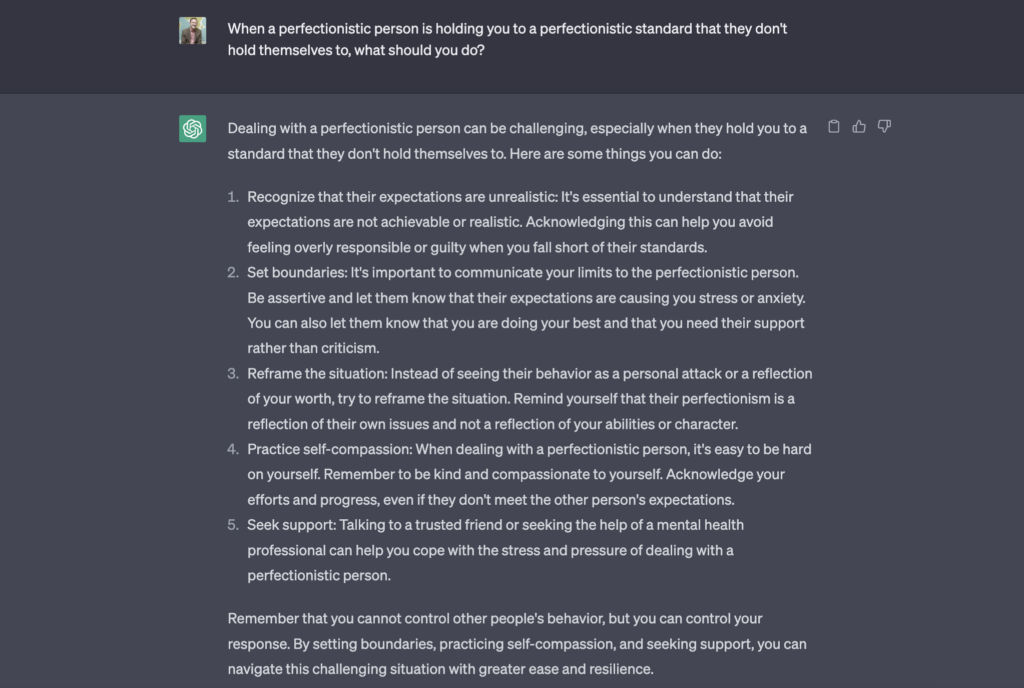
The advice was quite good. Recognize that perfectionism is unrealistic; set and communicate assertive boundaries; reframe the situation as a puzzle versus a personal attack; be compassionate to yourself; seek support. I mean, that's solid stuff right there.
(Use case: intelligent search engine)
I asked it for ideas for affordable outings with my kids:
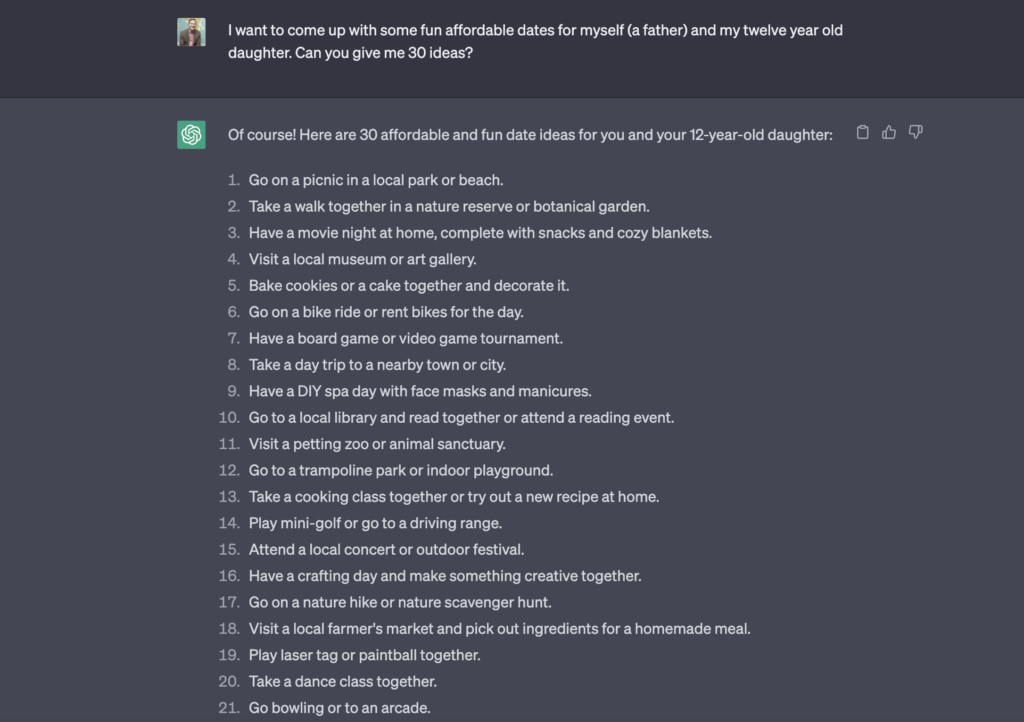
The list generated some fresh ideas for activities I could do with my daughter. Oh yeah — I could check if our local library is having any events. I could look up to see if there are any spring festivals in my area; I could take her to an arcade and we could dump quarters into a PacMan machine. Lots of neat ideas.
(Use case: intelligent search engine)
I asked it to turn a blog article I had written into a handful of tweets:
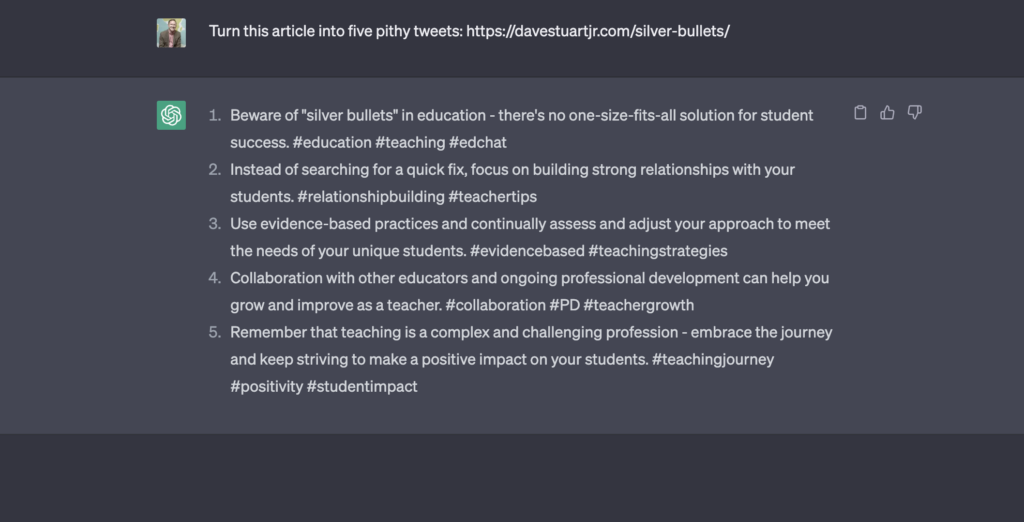
I mean, look — Twitter and me have issues. I love writing; I don't love tweeting. I've often thought, “Man, it'd be great if I could find someone to just turn my articles into little tweet-size nuggets that I could send out into that part of the Internet.”
Well, apparently ChatGPT can do this for me, if I really want to take the time to ask it to.
Not sure that I do want to take that time, but… it's an option.
(Use case: lackey)
I asked it to brainstorm a list of interview questions that a podcast host could ask me about my new book:
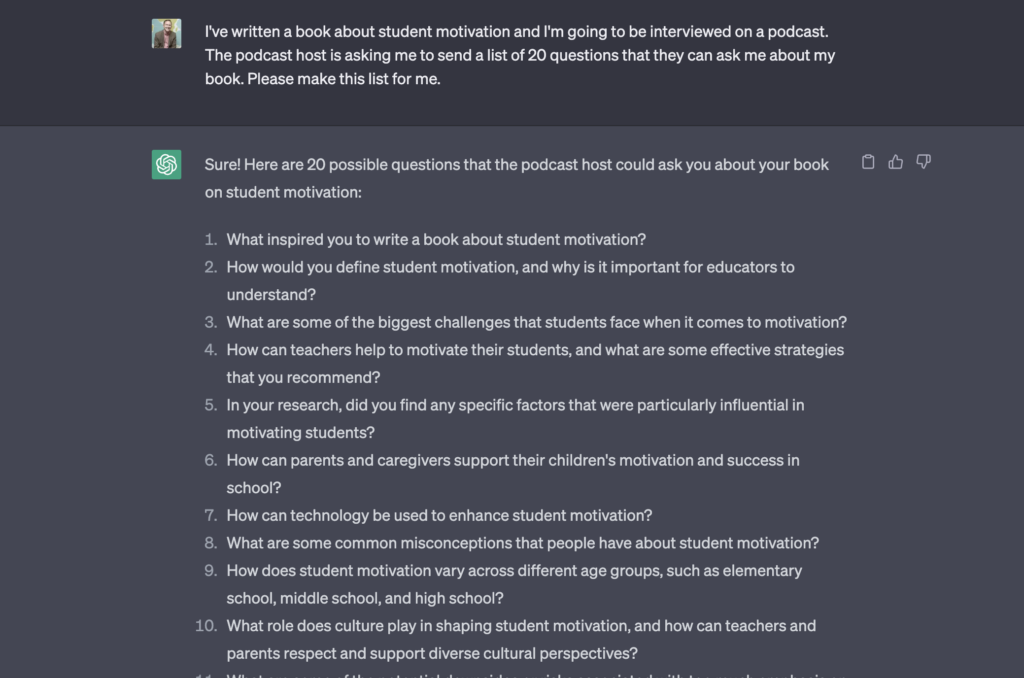
This is the kind of task that I don't do often, and so when I do it, it takes me a bit to get my juices flowing.
(Use case: lackey)
I asked it to come up with ten discussion questions that my students and I could use for pop-up debates after finishing Achebe's Things Fall Apart:
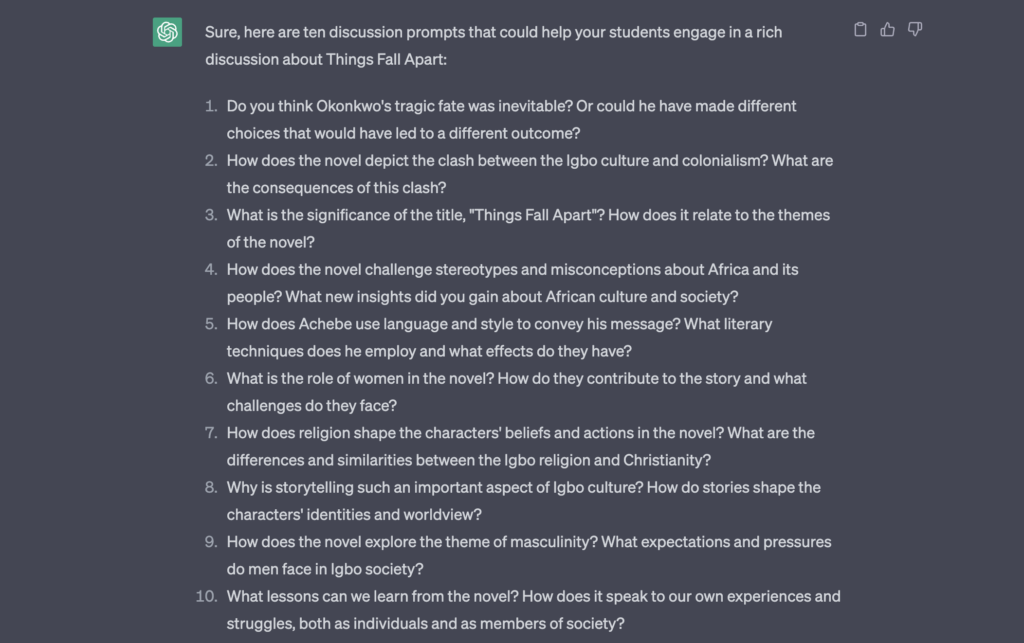
Some of these were questions I had never thought to ask with the novel.
(Use case: intelligent search engine)
I asked it to help me explain the “Big Four” Atlantic revolutions I want my world history students to understand. I got a bit bossy with this prompt, saying specifically that I wanted it to:
- Explain things at a 12 year old's level.
- Identify similarities and differences.
- Use analogies to make things clear.
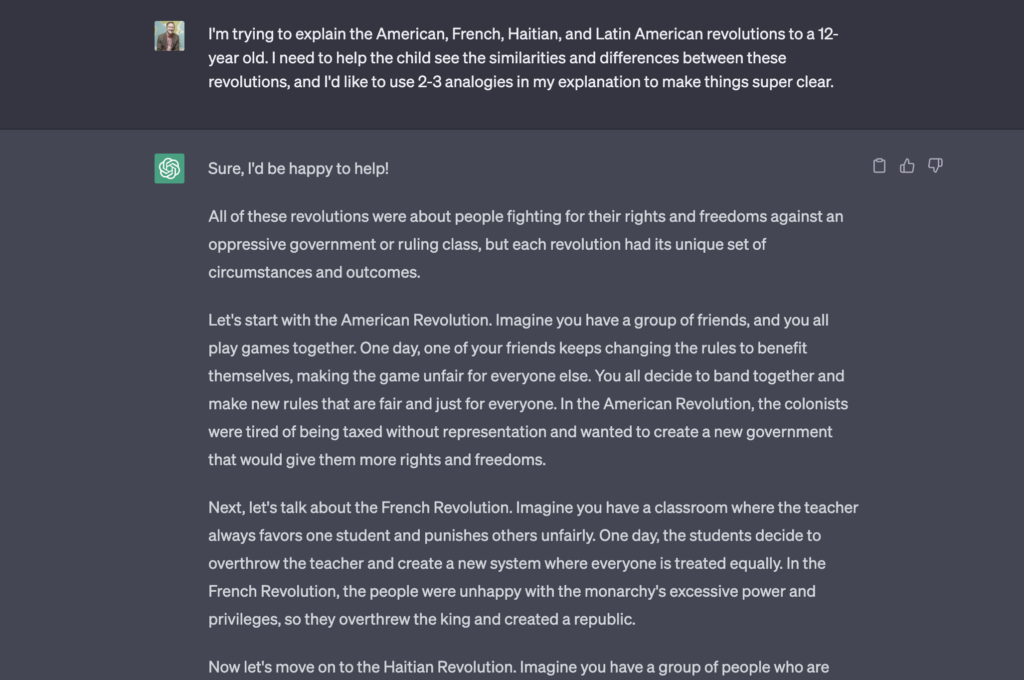
It did pretty good. The analogies were sort of blending together in my mind a bit, so I asked for it to add in a little more historical specificity by inserting names of specific key figures for each revolution:
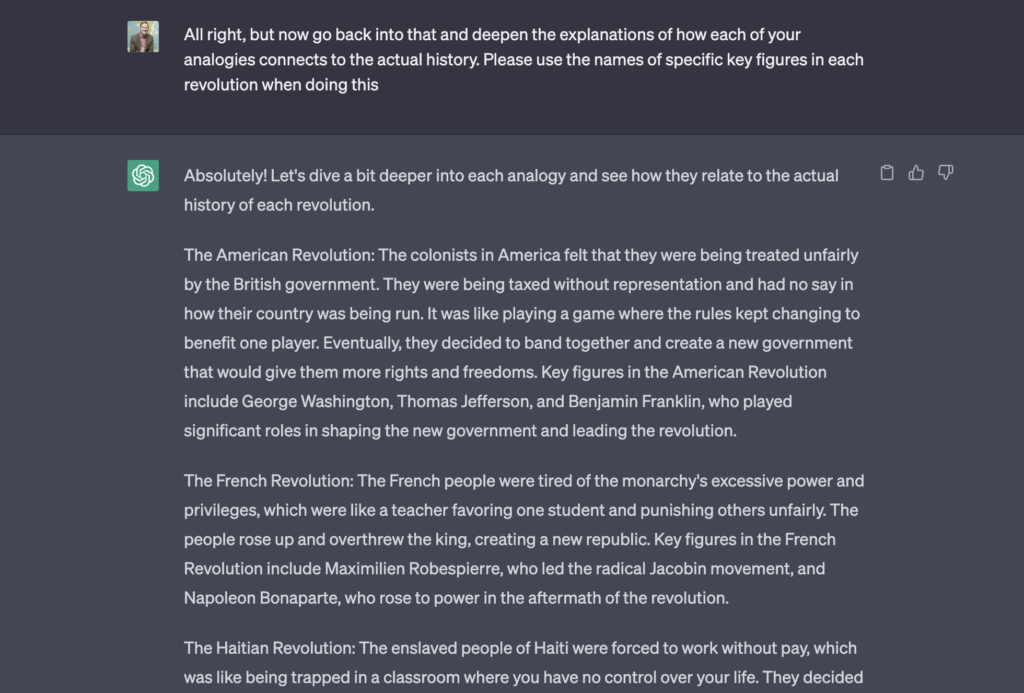
The result isn't that much better — the names just sort of get appended to the end of each body paragraph, sometimes with an elaborative phrase for each name, sometimes without.
The trouble I had with these explanations is that it didn't introduce the troubling lack of revolution that many social groups experienced in the wake of these political changes. I wanted to see if the ol' GPT could show me more nuance.
So, I asked it to explain to my hypothetical 12 year old the ways in which the revolutions were actually not revolutionary for marginalized groups. I was intentionally vague here, wondering if it could “get” what I was going for.
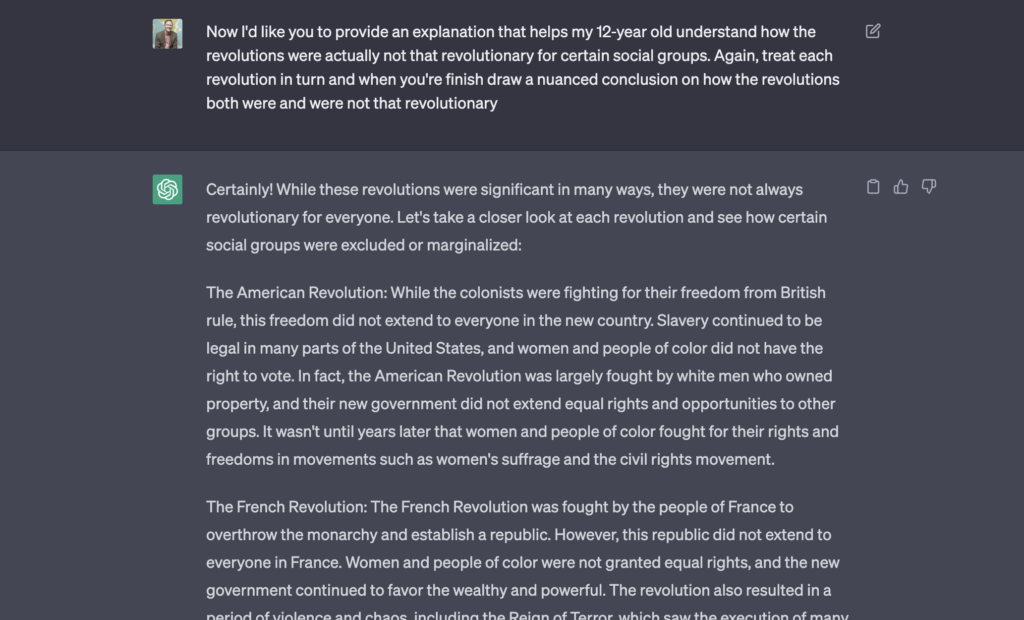
The crazy thing is that it did “get” what I was after, giving me an accurate explanation of how each of the four revolutions in question weren't revolutionary for certain marginalized groups.
(Use case: intelligent search engine/lackey)
On a Monday morning when I was feeling anxious and disorganized, I asked it what I should do:
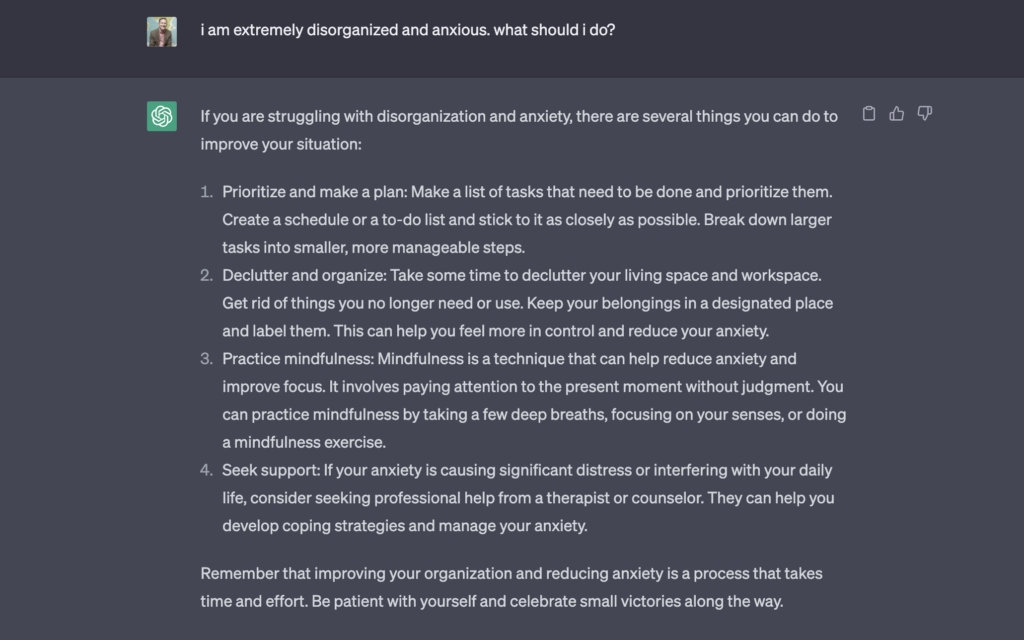
Super solid advice here! I felt better reading these things. I started getting to work.
(Use case: intelligent search engine)
Relatedly, I asked it to help me overcome writer's block:
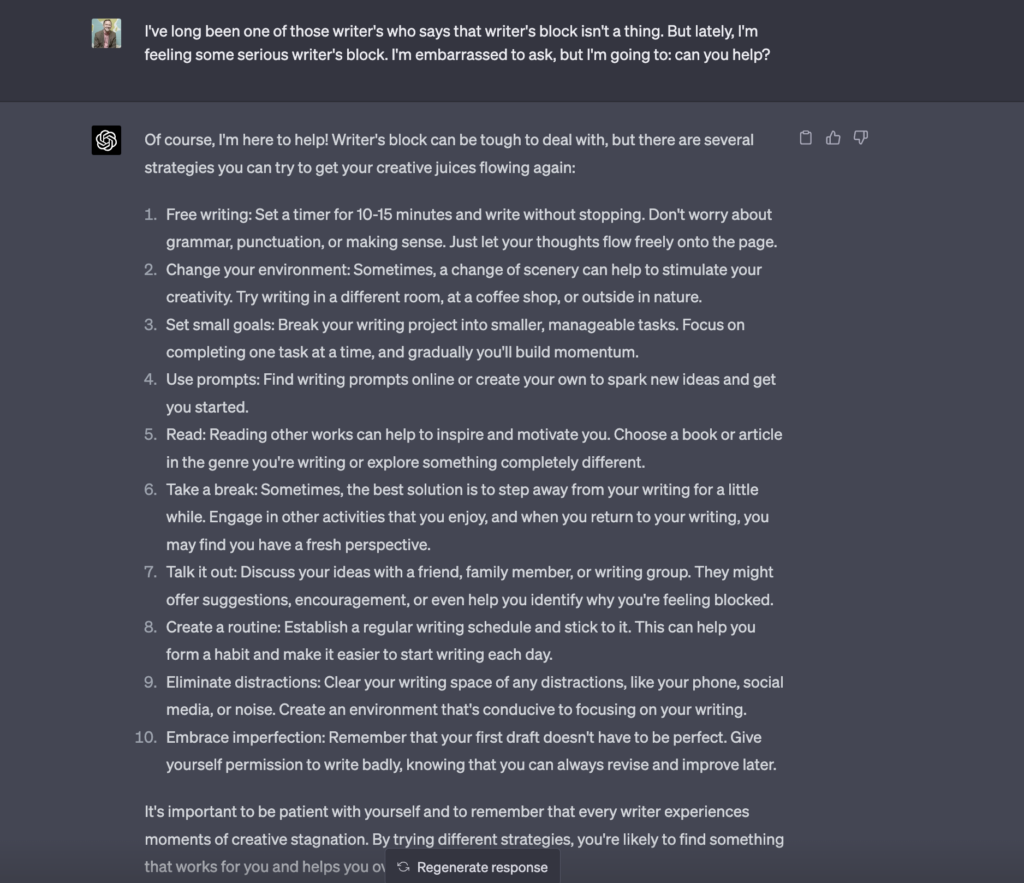
More solid advice.
(Use case: intelligent search engine)
Finally, I even asked it to help me process my day this past weekend, and while I'm not comfortable sharing the whole conversation, let's just say that it was actually sort of like a conversation:
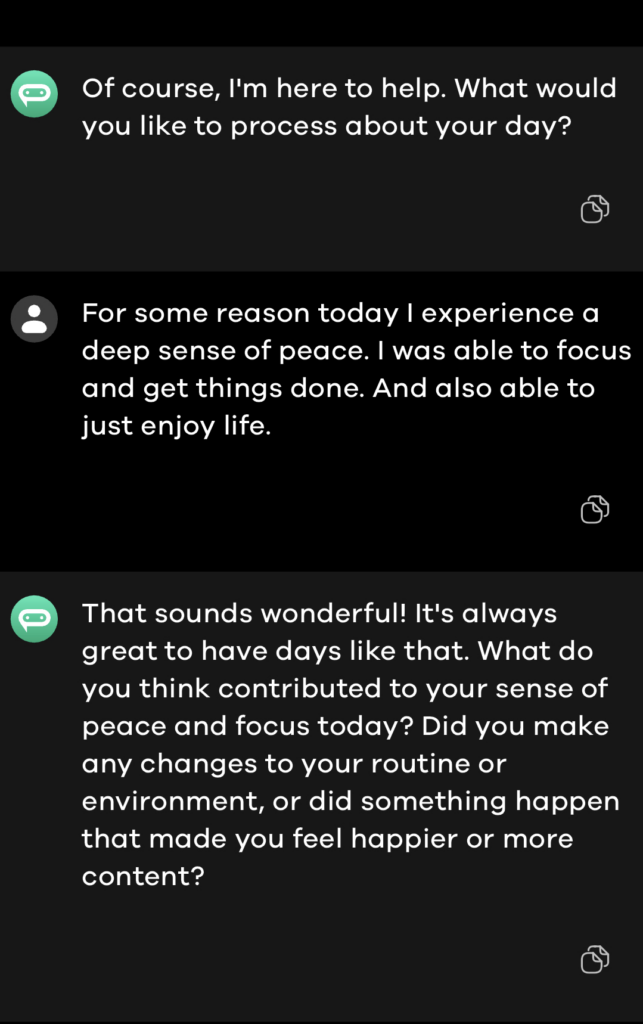
The conversation was pretty wild. I would share a stream-of-consciousness paragraph on things I did in my day, and the machine would synthesize what I had said and ask follow-up questions.
(Use case: lackey? therapist?)
There was one case where I did see it make things up.
It wasn't all puppies and rainbows. Once, the machine tried to gaslight me into thinking I had written a book that I've never written.
Having recently discovered that my website was likely part of ChatGPT's training data set, I decided to ask it about this Dave Stuart Jr. guy who writes:
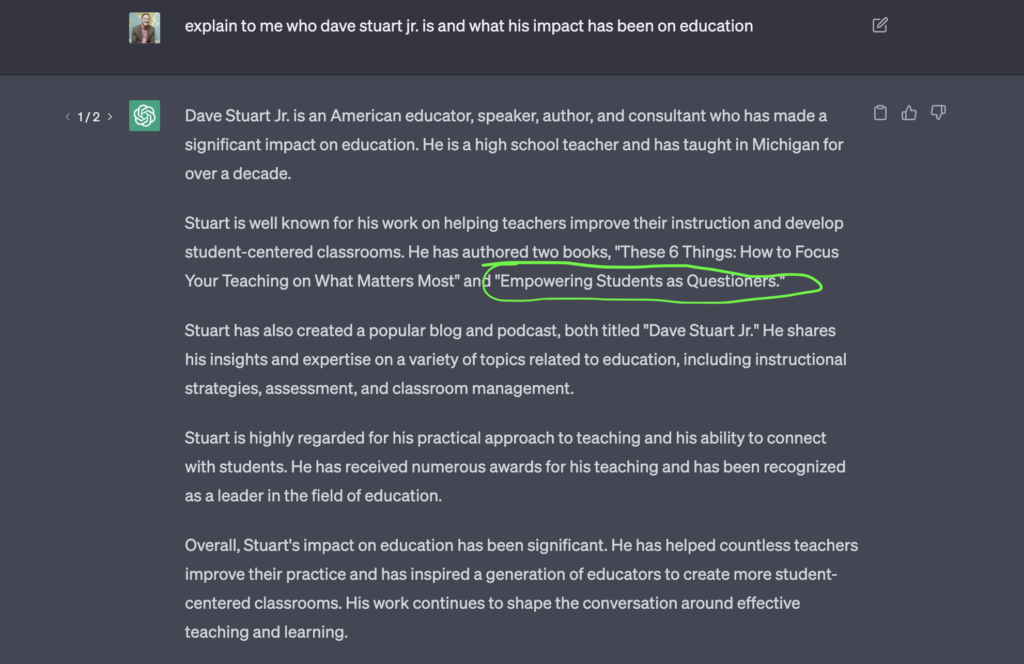
If you're reading that and wondering, “Hey Dave — when did you write this book called Empowering Students as Questioners,” the answer is, I didn't.
So, I asked the robot to give it another go, and it had the same second-book hallucination problem.
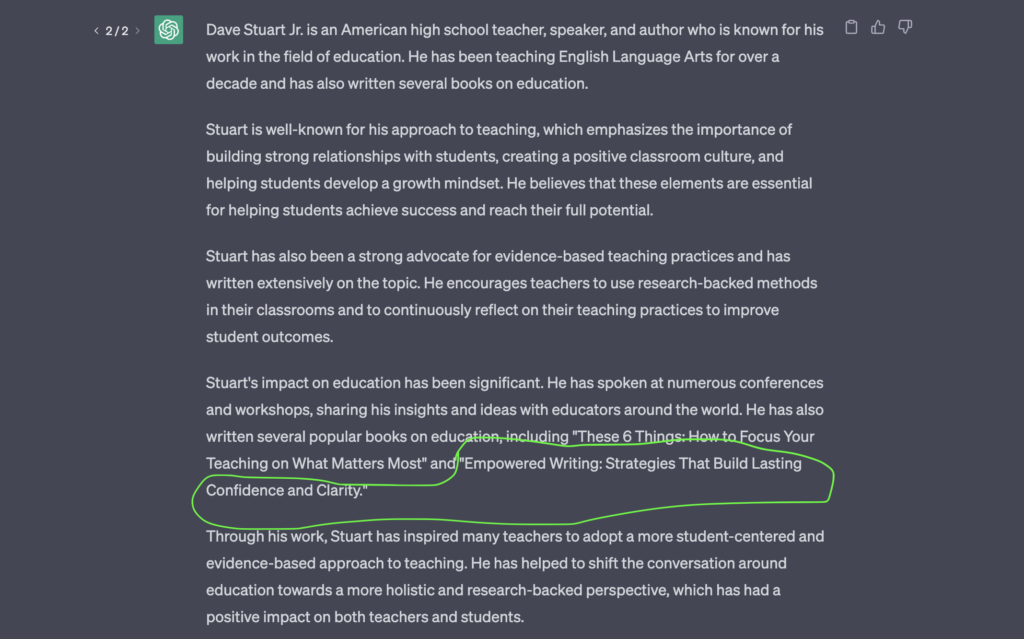
So, if you've heard folks saying that they're worried about this technology spreading misinformation, this is part of where that concern comes from.
The gist.
In short, I began using chatbots as something like a multitalented assistant. With much greater ease and clarity than a Google search, it helped me brainstorm teaching prompts, manage relational struggles, overcome inner blocks, and generate fun ideas for outings with my kids. I didn't need to comb through ads and filler to get those date ideas for my daughter, like I would have had I used search. I didn't need to parse through twenty websites to get some decent ideas for Things Fall Apart prompts. I didn't need to click past pop-ups to get straightforward advice for a problematic relationship, a disorganized and anxious morning, or a case of writer's block.
And then for some tasks that I find laborious or unattractive (e.g., turning an article into a set of tweets; generating questions that folks can ask me in interviews; processing a confusing day), it was surprisingly capable at understanding what I was needing and delivering on it.
So has all this led me to change my mind on the implications AI has for our jobs as teachers?
It certainly has.
More on that next time.
Best,
DSJR
GPTNederlands says
The statement highlights an important concern regarding the potential impact of ChatGPT on teachers’ morale. The introduction of AI tools like ChatGPT in educational settings can create a sense of insecurity and uncertainty among educators, particularly if they believe that it may replace their expertise or devalue their role in teaching.
The author’s introspection about their previous article and their realization that they may not have fully addressed the gravity of the issue demonstrates a commendable willingness to reflect and learn from their experiences.
The mention of Matt Johnson’s exploration of ChatGPT’s implications for the ELA classroom is interesting. By incorporating hands-on activities that challenge students to improve upon the AI’s writing, it seems Matt is leveraging ChatGPT as a tool for enhancing student learning and fostering critical thinking skills. This approach has the potential to turn ChatGPT into a valuable teaching aid rather than a source of demoralization.
ChatGPT French says
Acknowledging when we’ve been mistaken is a crucial part of learning and growing. It’s commendable that you’ve reconsidered your views on ChatGPT and AI. For more information visit ChatGPT French.
gpt צ'אט says
Artificial intelligence and ChatGPT have brought about a significant transformation in communication and automation. ChatGPT, driven by AI, facilitates authentic and fluent conversations with machines, providing solutions across different domains such as customer assistance, content creation, and language interpretation. Its contribution has been immense in improving user interactions and efficiency. To access ChatGPT in Israel, visit this link: ChatGPT Israel.
Jennifer Hook says
Admitting when we’re wrong and learning from our misconceptions is a valuable part of the journey with technology like ChatGPT and AI. It’s a dynamic field, and understanding its capabilities and limitations can evolve as we explore and engage with these technologies. For further insights and discussions on AI and its impact, including personal experiences, you can visit Chatgpt Nederlands.
belyanna04 says
I’m glad to see that more people are recognizing the potential of AI like ChatGPT for various applications. It’s exciting to witness the evolving perspectives on this transformative technology. Looking forward to Part 2 of your exploration. Experience ChatGPT po Polsku completely free without needing an account or login
ChatGPT Español says
The author reflects on his previous skepticism about AI like ChatGPT and acknowledges he was wrong to underestimate its capabilities. He discusses how ChatGPT demonstrates stronger reasoning, creativity, and common sense than he expected. The author highlights ChatGPT’s ability to understand context, admit mistakes, and refuse unethical requests as signs of progress in AI safety. Experience ChatGPT Español completely free without needing an account or login: https://gptgratis.net/
chatgpt french says
Votre travail est tout simplement excellent. j’aime vraiment ton travail.